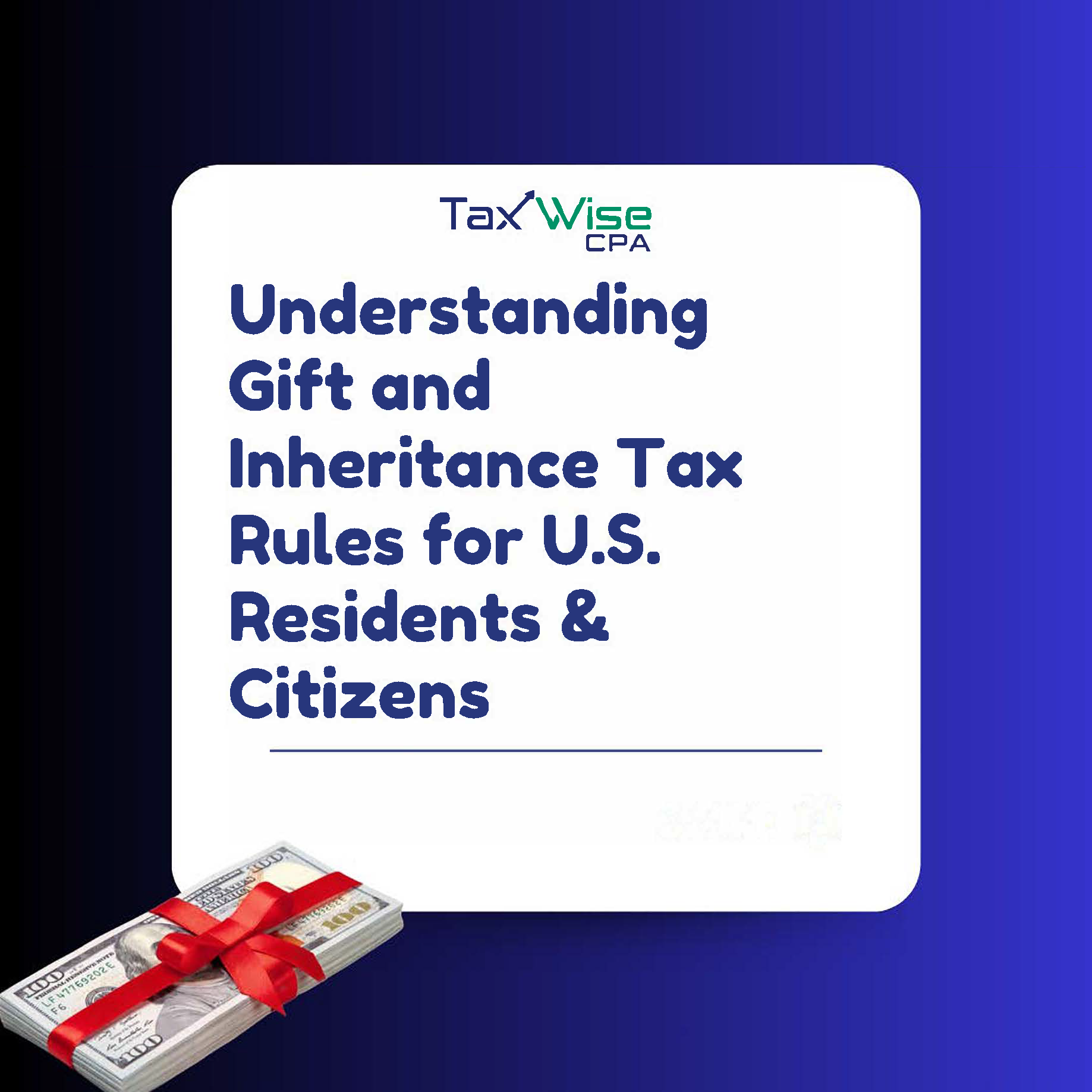
Understanding Gift and Inheritance Tax Rules for U.S. Residents & Citizens
Gifts given by a U.S. resident or citizen
The IRS annual gift tax exclusion for 2025 is $19,000 per recipient ($38,000 if gift-splitting for married couples). This is the amount of money a U.S. taxpayer is allowed to give as a gift to one person in a single calendar year without incurring gift taxes. This is an increase from the 2024 amount of $18,000. Additionally, you do not pay tax on gifts given, provided they are below the current lifetime exemption ($13.91 million). If gifts total more than $18,000 in 2024, the gift giver must file Form 709 ("United States Gift (and Generation-Skipping Transfer) Tax Return"), and the name and SSN of the gift beneficiary must be reported.
Inheritance or gifts received by a U.S. resident or citizen that exceed $13.91 million in 2024
If you exceed the 2024 annual gift exclusion amount of $18,000 and use some of your lifetime exemption ($13.91 million), Form 709 must be filed to report the gifts, even if no tax is due at the time. The IRS allows individuals to give away a certain amount of assets during their lifetime without owing gift tax (the lifetime exemption). In 2024, this amount is $13.91 million.
If the amount of the gift exceeds the lifetime gift exemption for tax purposes, then Form 706 ("United States Estate (and Generation-Skipping Transfer) Tax Return") should be filed. It is filed by the executor of the estate after obtaining an estate EIN for a decedent if the decedent was a U.S. resident or citizen.
Gift received from a foreign (non-U.S. resident alien) given to a U.S. resident/citizen
If the gift is less than $100k in value, there will be no tax-reporting required. https://www.irs.gov/businesses/gifts-from-foreign-person
If you receive an inheritance or gift from a foreign person (individual, estate, or trust) and the value exceeds $100,000, you are generally required to file Form 3520, titled "Annual Return to Report Transactions with Foreign Trusts and Receipt of Certain Foreign Gifts." The form must be printed and mailed to the IRS. It is required for disclosure purposes, not for tax assessment purposes.
Below is the basic information needed to file the form:
• Description of the gift or bequest
• Fair Market Value (FMV) of the inherited property
• Cost basis of the inherited property
• Date of inheritance
• Information about the foreign person or entity
Fair Market Value (FMV) of non-cash assets should be assessed at the date of inheritance or within 6 months of the decedent's death, and a certified appraisal can provide the evaluation for the FMV. If the amount is less than $100,000, then there’s no need to disclose it on the tax return of the recipient (who is a U.S. citizen receiving cash/inheritance from a non-U.S. person).
The inheritance is sold and money is received by the U.S. citizen
Schedule D needs to be filed. After the sale, if the asset's Fair Market Value (FMV) has increased from the date of evaluation, the difference will be subject to long-term or short-term capital gains taxes. If the FMV has decreased, capital losses will apply when selling the inherited foreign property.
When you inherit property, the basis (or value for tax purposes) of the property is "stepped up" to its FMV on the date of the decedent's death.
When you receive gifted property, the step-up in basis does not apply. Instead, the property you receive as a gift retains the donor's basis (the original cost basis the giver paid for the property). This is called a carryover basis.
If the U.S. person (heir) lived in a foreign inherited primary residence for at least two years of the five years preceding the sale of the property, they can exclude up to $250,000 of the capital gains from the sale for single filers and $500,000 for joint return filers.
Afnan is a Certified Public Accountant and hold a Master’s in Accounting degree from Wayne State University.
